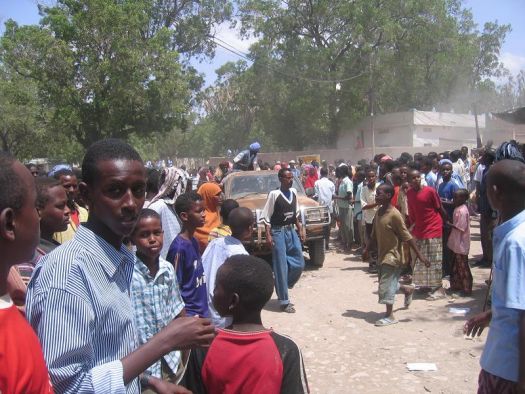|
Thousands of
Somalis welcome Ethiopian pullout
(Mogadishu, January
16, 2009 Ceegaag Online)

About 3,000 Somalis marched through the streets of the
war-scarred capital on Friday, celebrating the withdrawal of
Ethiopian troops and appealing for peace in a city where
thousands of people have died in fighting over the past two
years.
Waving twigs as a sign of peace and chanting slogans
appealing for peace, the marchers from different districts
and converged at the city's main football stadium, which
only two days ago was a base for Ethiopian troops.
The march and rally were organized by the Council of
Correction and Reconciliation, an influential group of
Islamic clerics not allied to any of the Islamic groups
fighting for power in Somalia. The council has in recent
months been mediating among the rival groups to get them to
stop fighting each other, which puts civilians in more
danger.
Council head Sheik Bashir Ahmed Salad said that with the
Ethiopians gone, Somalis should focus on peace.
"It is high time that all Somalis solved their
differences through dialogue and in a peaceful manner,"
Salad told the crowd.
Somalia's weak U.N.-backed government had called in the
Ethiopians in December 2006 to oust the Council of Islamic
Courts, the umbrella Islamic group that controlled Mogadishu
and southern Somalia for six months that year. The Ethiopian
army was viewed by many Somalis as abusive and heavy-handed.
Sheik Abdiqadir Ali Omar, a member of the Council of
Islamic Courts, called Friday for Islamic fighters to lay
down their arms.
"Now it is time to rebuild what has been destroyed," said
Omar. "It is time for the displaced people to return."
The last Ethiopian troops left Mogadishu on Thursday
after a two-year deployment. Islamist militiamen from
different groups took control of the bases the Ethiopians
vacated. No fighting was reported Thursday or Friday, but it
was not clear if this was an indication of longer-term
tranquility.
On Thursday, Ethiopia's prime minister said he could not
predict what would happen when his troops leave Somalia
completely, but he expected the extremist Islamic group al-Shabab
and others to try to seize control.
The African Union and the United States have been pushing
for months for a U.N. peacekeeping force, but finding troops
for a multinational force initially envisioned as a
precursor to a U.N. operation has been impossible.
The U.N. Security Council on Friday unanimously adopted a
resolution expressing its intention to establish the U.N.
force in Somalia, but put off a final decision for several
months to assess the volatile situation and work toward
strengthening the small African Union force deployed in the
capital.
The approved resolution renewed the mandate of the
African Union force for six months and urged African nations
to strengthen it from the current 2,600 to the 8,000
originally authorized.
It said the council intended to establish a United
Nations Peacekeeping Operation as a follow-on force to the
African Union's, subject to a further Security Council
decision by June 1.
U.S. Ambassador to the U.N. Zalmay Khalilzad said the
United States, which drafted the resolution, believes there
must be "a comprehensive approach that addresses the root
causes of instability in Somalia which includes political,
economic, humanitarian and security issues."
"The resolution adopted today essentially addressed the
root causes by making a clear commitment that the Security
Council will assume its responsibility with regard to
Somalia," he said.
The Al-Shabab, which the U.S. considers a terrorist
organization with links to al-Qaida, says it wants to
establish an Islamic state in Somalia. The group says it
will now focus its attacks on the African Union peacekeepers
in Mogadishu.
The departure of the Ethiopians has raised fears of a
power vacuum at a time when Somalia is also facing rampant
piracy off its coast. The country has not had a functioning
government since 1991 and few expect that a Somali force can
establish order even with the help of a relatively moderate
faction of Islamists who had agreed to share power in
October.
The African Union has said the government and its Islamic
allies have about 10,000 troops, but they are poorly
equipped and require logistical support.
In a separate development, Somali journalist Abdifatah
Mohamed Elmi, who was kidnapped in August, said his captors
had released him but he did not know the whereabouts of two
journalists kidnapped with him. He said no ransom was paid.
Elmi was kidnapped with Canadian journalist Amanda Lindhout
and Australian freelance photographer Nigel Brennan.
Lindhout works for French TV station France 24 and Global
National News of Canada, according to Paris-based Reporters
Without Borders.
Source: Associated Press

webmaster@ceegaag.com |

